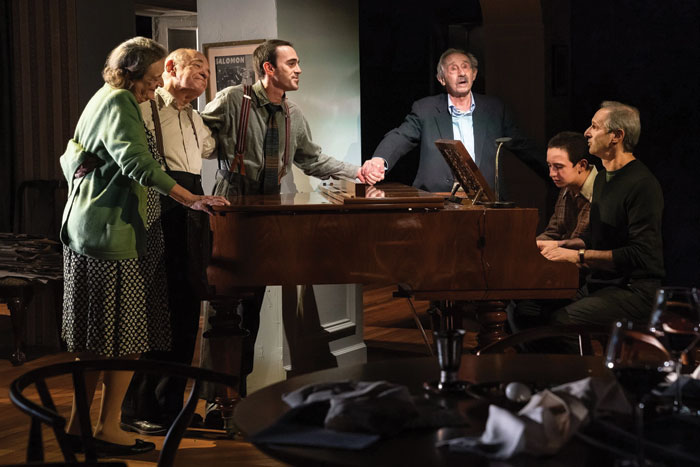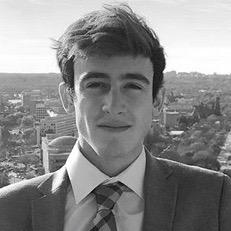 Cast of “Prayer for the French Republic”
Photo by Matthew Murphy
Cast of “Prayer for the French Republic”
Photo by Matthew Murphy “Prayer for the French Republic” is a very Zionist play. Set in Paris in both 2016 and 1945, the production, which opened off-Broadway in February, follows the Salomons—a Jewish family forced to navigate different breeds of European antisemitism throughout the decades. They eventually come to the conclusion that after the Charlie Hebdo attack, the Sarah Halimi murder, and the possibility of a President Marine Le Pen, there is no choice but to move to Israel. Playwright Joshua Harmon captures the psychological toll that accompanies the realization that one’s home country is no longer safe. It’s an epiphany made all the more painful given that France was the first nation to emancipate its Jews and that the Jewish community still recites the prayer for the French Republic in synagogue as an expression of loyalty and citizenship. The line that closes the final act, “it’s the suitcase or the coffin,” punctuates the feeling of desperation the Salomon family and generations of Jews before them have grappled with in leaving everything behind.
The line that closes the final act, “it’s the suitcase or the coffin,” punctuates the feeling of desperation the Salomon family and generations of Jews before them have grappled with in leaving everything behind.
The head of the Salomon family is Charles, married to Marcelle. Charles resembles a typical American Jewish father, though his ancestry traces back to Algeria. Marcelle is the classic archetype of a New York-born Jewish mother, emotional and charismatic, as seen in scenes when dirty wine glasses in the living room boil over into full-blown family confrontations. Their children are Elodie, an opinionated but immature young woman, and Daniel, a newly observant Orthodox Jew who is brutalized on the streets of Paris while wearing a yarmulke. Patrick is Marcelle’s brother, intensely secular and disdainful of his family’s convictions, regarding Judaism as something archaic and unnecessary. This attitude is originally shared by Molly, a left-wing American cousin of the Salomons who is studying abroad in France.
“Prayer for the French Republic” is successful at highlighting the tension between those who take their Jewish identity seriously and those who have been conditioned not to do so. Harmon portrays both Patrick and Molly as out of touch, uneducated, and even as malicious forces for the Salomons, who are greatly influenced by maintaing their son’s continued safety and their family’s sacrifices in generations prior. We root for the Salomons to make it to Israel not only because it would encapsulate a climax of the Jewish story, but also because the move would rebel against the assimilationist, anti-Zionist forces keeping them back.
But the play is anything but subtle, to its own detriment. Rather than incorporating the important themes of antisemitism and national liberation into the subtext of the work, the dialogue reads as opinion pieces in Jewish newspapers, drowning audiences in long monologues on the intricacies of the Israeli-Palestinian conflict and soliloquies on the question: “Why do they hate us?” It’s hard to believe such conversations were meant to resemble believable family discussions. Harmon’s points are presented to audiences in a somewhat academic manner rather than with natural dramatic prose. It’s more likely that this play was written to educate American audiences, perhaps too blatantly and obviously, on the plight of their fellow Jews overseas. Perhaps this is why the Salomons walk and talk like Americans, rather than French Jews who have been wrestling with these problems for years.
Only in the last few years have American Jews emerged from the comfortable sense that antisemitism was something of the past, or only the domain of the far-right. By this metric alone, I’m sure many theatre-goers, both Jewish and non-Jewish, were deeply moved by “Prayer for the French Republic,” but to those attuned to the politics of the Jewish community, to those aware that antisemitism can indeed come from both the right and the left, “Prayer” fails to offer anything new or artistically notable.
Perhaps Harmon was aware of this discrepancy, and perhaps this contributed to the characterization of Patrick and Molly. Harmon may be trying to warn us that the winds of change will not just affect the Jews over there, and implicitly asks us: “Which character do you want to be, which Jew do you want to be?” This is certainly an ambitious approach in making a broader argument about the role of modern Jewry, and yet, realistic execution remains of paramount importance when dealing with such pressing subject matter.
“Prayer for the French Republic” remains a deeply Zionist play. For this I am grateful, considering Broadway is currently wading through an era of preachy social justice, where political ideas being propagated in the theatre are just as expected as the intermission.
Still, “Prayer for the French Republic” remains a deeply Zionist play. For this I am grateful, considering Broadway is currently wading through an era of preachy social justice, where political ideas being propagated in the theatre are just as expected as the intermission. If “Prayer” is not able to transcend the preachiness, at least it is authentically Jewish. It represents the Jewish story as a particular phenomenon rather than a universalist message against racism. Through the Salomon family’s petty arguments and internalization of threatening political winds, each act strings together fragments of Jewish history with contemporary anxieties. It is crucial that Jews continue to make such a stand in the arts. It is crucial that we make the case for our perspective, with all the baggage behind it. The success of “Prayer for the French Republic,” both commercial and critical, should tell us that these stories deserve to be told, and that the public hasn’t yet been dissuaded from listening. ■
Blake Flayton is New Media Director and columnist at the Jewish Journal.























 More news and opinions than at a Shabbat dinner, right in your inbox.
More news and opinions than at a Shabbat dinner, right in your inbox.